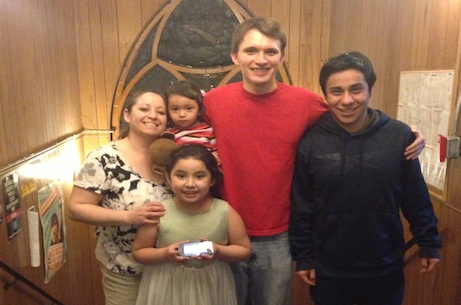
Scholar Elect Adam Cowden talks about how his own family background influenced his interest in studying the multi-dimensional nature of social inequality.
Adam Cowden’s interest in the multi-dimensional nature of social inequality stems in large part from his own family background. He is the oldest of 11 children, five of whom were adopted from inner city Chicago neighbourhoods.
Adam was a teenager when his first adopted sibling joined the family. Originally his parents planned on adopting only one child, but the adoption agency got in touch and said they had another who they could not place. The family were told that sister had a half sister who also had a half sister who needed adopting. The family also fostered another child and ended up adopting them too.
Adam was 16 and the oldest of five children when his first adopted sibling, now aged seven, joined the family. He says that it was not a big change for him to have more children in the family. “I had grown up with little people in the house my whole life,” he says. What was a change though was the contact with his siblings’ birth parents. “Being exposed to people who lived in a totally different world just 40 minutes from where I grew up had a big impact,” he says.
At first, Adam found it sometimes hard to deal with or relate to them as they seemed quite confrontational and suffered from multiple issues. However, as he got to know them it became apparent that the things that happened to them were in large part determined by their circumstances “in ways that made it very difficult for them to alter their course”. “It was not just one issue,” he says. “There were multiple issues and each issue compounded the other.”
Politics
Adam’s family experience fomented a growing interest in social issues. He had originally been intending to study music at university, given that he played guitar and drums and was in several bands. Indeed he started up a music organisation at university dedicated to connected campus musicians. Instead, however, he started looking at the possibility of majoring in peace studies and taking a minor in poverty studies. In the end he felt this was too generic so he chose to study politics, philosophy and economics at the University of Notre Dame.
He joined the Glynn Family Honors programme and as past of the programme had to do a thesis in his final year. He studied the links between social welfare programmes, birth rates and educational welfare in Africa. His main focus was on the impact of the introduction of universal pensions in Botswana and Mauritius. After interviewing mothers, he found no evidence that the universal pensions had consciously affected behaviours regarding fertility and education, but he did find evidence that these behaviours had changed significantly directly after the introduction of the pensions. Adam also found that he really enjoyed the research process.
During his undergraduate degree he also spent time studying in London, competed in amateur boxing competitions and did a three-day immersion experience at Su Casa, a Catholic non-profit dedicated to helping people affected by domestic violence, through his University’s Centre for Social Concerns.
Su Casa
After graduating he wanted to get some work experience in the music business so headed to Nashville where he did an internship at a recording studio. At University, he had played guitar in a cover band and in Nashville he continued to play, but focused more on the production process. After a year, however, he wanted to move on and do something different so he headed back to Su Casa. He has been working as a full-time live-in volunteer there since last September. Most of the people at the shelter are women and children of Latin American origin who are fleeing domestic violence. His responsibilities cover everything from cleaning bathrooms to case management and helping families access education, housing and health resources.
He also works on the organisation’s website. “The challenges families are facing are similar to the ones I experienced in my own family,” he says. “Many, particularly the children, have large obstacles they have to overcome. Often they come from abusive backgrounds. They haven’t had a good education. Their mothers haven’t had a good education and can’t read or write so can’t help the children with their homework. Our focus is on breaking these cycles.”
Soon after starting work at Su Casa, Adam applied to the University of Cambridge to do a MPhil in Planning, Growth and Regeneration. What drew him to the Cambridge course was that is addressed inequalities and development as multi-layered issues. One of his professors at the University of Notre Dame had suggested the course several years earlier after talking to him about his interests. His MPhil will focus on the disparities in growth and development in developed countries and will seek to address poverty through looking at issues such as health, education and urban planning. “The environment people live in is very important in determining their lives,” he says. “I want to study, for instance, how spaces deter economic opportunities and how we can create more equal development.”
Picture: Adam at Su Casa.












